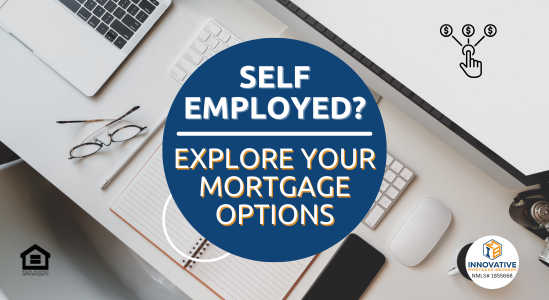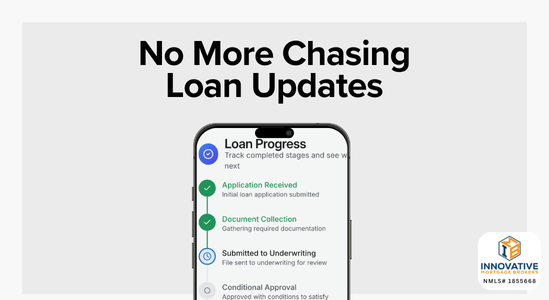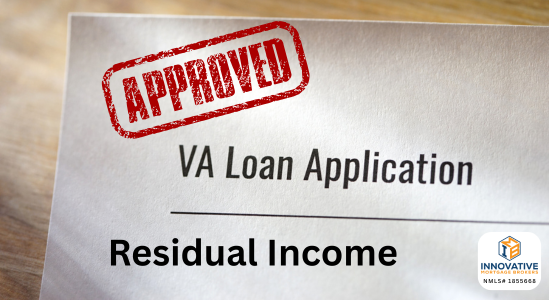Mortgage rate volatility, oil shocks, and why execution matters more than quotes When a war…
Self-Employed and Looking for a Mortgage? Here’s What You Need to Know
A Comprehensive Look at Loan Options and Strategies for Self-Employed Borrowers
As a self-employed borrower, you may have encountered additional hurdles when trying to secure a mortgage for buying a home, upgrading your existing property, or refinancing. Mortgage lending is often structured around borrowers with traditional W-2 income, making the process more complex for those who are self-employed. However, at Innovative Mortgage Brokers, we specialize in helping self-employed individuals overcome these challenges by offering a range of competitive loan programs tailored to your unique financial situation in Pennsylvania (PA) and Florida (FL).
In this article, we’ll explore the options available for self-employed borrowers, highlight potential pitfalls to avoid, and discuss how you can position yourself for success in securing a mortgage. Whether you’re looking to purchase your first home, upgrade, refinance, or invest in a rental property, this guide will provide the information you need to make informed decisions.
Challenges Faced by Self-Employed Borrowers
Self-employed individuals often face more scrutiny from lenders due to the variability of their income and the complexity of their tax returns. Traditional W-2 employees have stable, verifiable income, which makes the mortgage qualification process straightforward. For self-employed borrowers, however, the situation is more nuanced.
One of the main issues for self-employed borrowers is that they often take advantage of tax deductions to reduce their taxable income, which can make their income appear lower than it actually is. Lenders may have difficulty assessing true income and might hesitate to approve loans based on what’s reported on tax returns.
Moreover, some underwriters may not fully understand how to evaluate the financial health of a business or recognize which expenses can be “added back” to income during the loan qualification process. At Innovative Mortgage Brokers, we help bridge this gap by working closely with underwriters and utilizing alternative loan programs to help you qualify for the mortgage you need.
Tips for Self-Employed Borrowers Looking to Purchase or Upgrade Their Home
If you’re self-employed and looking to buy a new home or upgrade your existing property, here are some tips to ensure the process goes smoothly:
Prepare Your Financial Documents
Lenders typically require two years of personal and business tax returns for self-employed borrowers, along with additional documents such as profit and loss statements, balance sheets, and bank statements. Make sure all your documentation is in order before applying for a mortgage.
- Profit and Loss Statements: This document shows your company’s revenue, costs, and expenses over a period of time. Lenders use this to assess the health of your business.
- Bank Statements: Some lenders may ask for bank statements to verify that you have enough liquid assets to cover your down payment and closing costs.
Maximize Your Income on Paper
While tax deductions can reduce your taxable income (and tax bill), they can also hurt your chances of qualifying for a mortgage. Consider working with your accountant to minimize deductions in the two years leading up to your mortgage application to ensure your income looks favorable on paper.
Consider Alternative Lending Options
If traditional lenders won’t approve your loan based on tax returns, consider non-traditional (non-QM) loan options, such as bank statement loans or asset utilization loans. These programs allow you to qualify based on alternative documentation methods, making it easier to secure a mortgage without meeting the strict requirements of conventional loans.
Show a Stable Income History
Lenders want to see at least two years of stable or growing income. If your business has experienced fluctuations, be prepared to explain the reasons and show a longer-term upward trend in your earnings. This reassures the lender that your income is stable and reliable.
Refinancing as a Self-Employed Borrower
If you’re looking to refinance your mortgage to take advantage of lower interest rates, reduce your monthly payment, or consolidate debt, the process can be just as challenging as buying a home—especially if your income has fluctuated since you took out the original loan. However, there are ways to improve your chances of approval.
Refinance for Better Terms
Many self-employed borrowers refinance to get better interest rates or terms. Even if you faced challenges getting your original mortgage, refinancing could help you secure a lower rate, reducing your monthly payment and saving you money over time.
Tap Into Equity
For those who have built up equity in their homes, refinancing can also offer an opportunity to tap into that equity and use the funds for home improvements, debt consolidation, or other financial needs. By refinancing through a cash-out refinance, you could access the money tied up in your property.
Bank Statement Loans for Refinancing
If you don’t qualify for a traditional refinance based on tax returns, a bank statement loan may be an option. This type of loan allows you to qualify based on personal or business bank statements, rather than your tax returns, giving you more flexibility in the approval process.
Investing in Rental Properties as a Self-Employed Borrower
If you’re self-employed and looking to invest in real estate, either as a way to generate passive income or diversify your portfolio, you’ll need to navigate the mortgage landscape carefully. Thankfully, there are programs tailored to real estate investors that can help.
DSCR Loans for Investment Properties
Debt Service Coverage Ratio (DSCR) loans are designed for borrowers who are investing in rental properties. These loans allow you to qualify based on the cash flow of the property, rather than your personal income. Essentially, if the property’s rental income can cover the mortgage payment, you may qualify for the loan. This is an excellent option for self-employed individuals with multiple sources of income or those looking to invest in properties without relying on their tax returns.
Plan for Down Payment and Reserves
Investment properties typically require larger down payments than primary residences, often 20% or more. Additionally, lenders may require you to show that you have reserves to cover a few months of mortgage payments in case of vacancies or rental income shortfalls. Make sure you have these funds set aside before applying for a loan.
Work with a Broker Experienced in Investment Loans
Because investment properties come with unique challenges, it’s important to work with a mortgage broker who understands the intricacies of investment lending. At Innovative Mortgage Brokers, we have extensive experience helping investors secure financing, whether it’s through traditional mortgage programs or specialized options like DSCR loans.
Why Work with Innovative Mortgage Brokers?
At Innovative Mortgage Brokers, we specialize in working with self-employed borrowers in Pennsylvania (PA) and Florida (FL). With over 15 years of experience, we understand the complexities involved in securing a mortgage when you’re self-employed or investing in real estate. As a mortgage broker, we have access to a wide range of loan products and competitive rates, ensuring that we can find the right mortgage solution for you.
Access to a Variety of Loan Programs
We offer a variety of traditional and non-traditional loan options, including:
- Conventional Loans
- Bank Statement Loans
- Asset Utilization Loans
- DSCR Loans for Investment Properties
Whether you’re buying, upgrading, refinancing, or investing, we’ll help you navigate the process and find the right loan for your situation.
Experience Working with Self-Employed Borrowers
We understand the unique challenges self-employed borrowers face, and we know how to help you overcome them. From interpreting your tax returns to finding the right loan program, we’re here to make the mortgage process as smooth as possible.
Competitive Rates and Transparent Service
We believe in offering competitive rates and transparent service, with no hidden fees or surprises. We’ll work with you to ensure you understand every aspect of your mortgage, from application to closing.
Final Thoughts
Being self-employed shouldn’t limit your ability to secure the right mortgage. At Innovative Mortgage Brokers, we’re committed to helping self-employed borrowers navigate the mortgage process with ease. Whether you’re purchasing your first home, upgrading, refinancing, or investing in rental properties, we have the experience and the loan options to meet your needs. Reach out to us today to learn how we can help you achieve your real estate goals!





